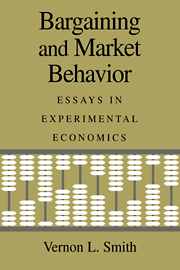Book contents
- Frontmatter
- Contents
- Preface
- Part I Economics and Psychology
- Part II Bargaining Theory, Behavior, and Evolutionary Psychology
- Part III Institutions and Markets
- INTRODUCTION
- 10 Reflections on Some Experimental Market Mechanisms for Classical Environments
- 11 Experimental Methods in the Political Economy of Exchange
- 12 Individual Rationality, Market Rationality, and Value Estimation
- 13 Market Contestability in the Presence of Sunk (Entry) Costs
- 14 The Boundaries of Competitive Price Theory: Convergence, Expectations, and Transaction Costs
- 15 Off-Floor Trading, Disintegration, and the Bid–Ask Spread in Experimental Market
- 16 Bertrand-Edgeworth Competition in Experimental Markets
- 17 An Experimental Examination of the Walrasian Tâtonnement Mechanism
- Part IV Stock Markets and Bubbles in the Laboratory
- References
- Index
10 - Reflections on Some Experimental Market Mechanisms for Classical Environments
Published online by Cambridge University Press: 29 October 2009
- Frontmatter
- Contents
- Preface
- Part I Economics and Psychology
- Part II Bargaining Theory, Behavior, and Evolutionary Psychology
- Part III Institutions and Markets
- INTRODUCTION
- 10 Reflections on Some Experimental Market Mechanisms for Classical Environments
- 11 Experimental Methods in the Political Economy of Exchange
- 12 Individual Rationality, Market Rationality, and Value Estimation
- 13 Market Contestability in the Presence of Sunk (Entry) Costs
- 14 The Boundaries of Competitive Price Theory: Convergence, Expectations, and Transaction Costs
- 15 Off-Floor Trading, Disintegration, and the Bid–Ask Spread in Experimental Market
- 16 Bertrand-Edgeworth Competition in Experimental Markets
- 17 An Experimental Examination of the Walrasian Tâtonnement Mechanism
- Part IV Stock Markets and Bubbles in the Laboratory
- References
- Index
Summary
We must teach him what we know before we can show him what we see.
N. R. HansonTwo themes are illustrated in the selection of experimental studies of market mechanisms for classical (pure private good) environments that will be discussed in this chapter.The first theme is perhaps best expressed in the question: Do you see what I see? Depending upon what one is looking for, what one expects to see, or which “results” are emphasized, different individuals may read or interpret differently the results of an experiment. This is a natural consequence of the desirable objective of reading, interpreting, and socializing the meaning of experimental outcomes.
Facts do not speak for themselves. As noted by N. R. Hanson (1969), facts are theory-laden. Consequently, to say that “Economists cannot make use of controlled experiments to settle their differences” (Robinson, 1977, p. 1319) is not only to make a patently erroneous statement (experimental economics is alive and well) but to misunderstand the nature of experimental evidence as well. Experimental results may generate differences at least as often as they settle differences, and they may sometimes settle some differences while simultaneously creating new differences. The theory-laden character of experimental results is well illustrated by Kaplan's (1964, pp. 153–4) report of an experiment in which rats, caged alone, were trained to obtain food pellets by pressing a lever on the opposite end of the cage. When two rats were put into the cage, and one pressed the lever, the other rat was always able to get to the pellet slot first. Eventually both rats were waiting at the food slot and neither pressed the lever.
- Type
- Chapter
- Information
- Bargaining and Market BehaviorEssays in Experimental Economics, pp. 206 - 239Publisher: Cambridge University PressPrint publication year: 2000
- 1
- Cited by



